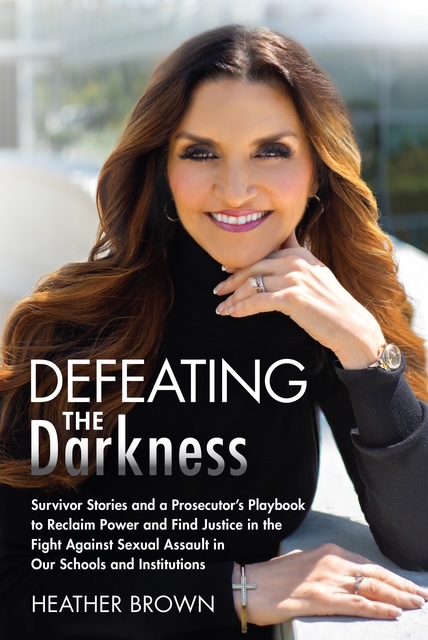One of the nation’s most devastating and hidden crimes thrives in silence with its victims often weighed down by shame and fear, while perpetrators walk free. Sexual abuse affects millions, yet it still remains shrouded in secrecy and survivors carry their trauma in isolation, never speaking out or seeking justice. What’s worse is that outdated legal systems have locked many of these survivors out with statute-of-limitations laws that prevent them from even pursuing their cases, but change is finally coming.
Many states across the country are revising these laws, opening a door for survivors to step forward, share their stories, and demand accountability—no matter when the abuse occurred. This shift is not just a reform, but a powerful wave of hope, offering survivors a chance at justice and a step toward preventing future harm.
With more than 20 years of experience as a prosecutor, Heather Brown is a formidable force in the fight against sexual violence. She’s built a career holding perpetrators accountable criminally and giving survivors a platform, but her work doesn’t stop at the courtroom—she’s determined to rip down the walls of secrecy that have long protected abusers. In her book, Defeating the Darkness: Survivor Stories and a Prosecutor’s Playbook to Reclaim Power and Find Justice in the Fight Against Sexual Assault in Our Schools and Institutions, Brown delivers a hard-hitting call to action, for survivors to reclaim their power.
Survivors Don’t Have to Suffer in Silence. Brown’s message is clear: the first step in taking back your life is breaking the silence. “No one has to carry this burden alone,” Brown asserts and these words are a lifeline for those drowning in the aftermath of abuse. Survivors often believe their stories don’t matter or that it’s too late to seek justice, but Brown is here to tell them otherwise. “There’s an army of people ready to stand by you,” she insists, “and your courage to speak up can change lives—yours and countless others.” Her book equips survivors with tools to heal, seek justice, and shine a spotlight on institutions that enable abuse, and thanks to shifting legal landscapes, survivors now have more opportunities than ever to do just that.
Breaking the Silence: Survivors Must Report the Abuse. When it comes to seeking justice, Brown is unapologetically direct: “Report it to the police. That’s where it starts.” Too often, survivors wrestle with doubts—about being believed, about retaliation, about whether it’s even worth the fight, but Brown emphasizes, “Reporting abuse sets crucial wheels in motion and takes immense courage, but it’s a crucial step toward justice. Starting with a police report, authorities can determine whether there’s a criminal case against the perpetrator. This process often inspires survivors to explore civil action as well, reaching out to attorneys to evaluate whether schools, churches, or other institutions were negligent in their duty to protect. Coming forward not only seeks accountability but also shines a light on the systemic failures that allow abuse to persist.”
“Institutions must be held accountable,” Brown says, “and survivors deserve to know they have legal options, even years later.” The prevalence of sexual abuse in institutions is staggering. Recent changes in laws, like extended statutes of limitations and look-back windows, mean that survivors who’ve stayed silent for years now have a chance to pursue justice. In California, for instance, survivors can file lawsuits for child sexual abuse until their 40th birthday.
The Epidemic Hiding in Plain Sight. The numbers don’t lie. Sexual abuse in institutions is staggeringly common, yet it remains one of society’s best-kept secrets. Brown’s work exposes this hidden epidemic and challenges the cultural norms that allow it to persist. “We can’t fix what we refuse to acknowledge,” she says, urging communities to face these realities head-on.
It’s an uncomfortable fact that some of the places we trust the most—schools, churches, youth organizations—are also where abuse often occurs. “We like to think these spaces are safe,” Brown explains, “but they’re where predators exploit trust to gain access to kids.” Brown highlights that many perpetrators gain access to children by positioning themselves in trusted roles, such as coaches, Sunday school teachers, or youth leaders. “The places we think are safest are often where abuse occurs,” she says. “This undermines a survivor’s sense of security and leaves lasting emotional scars.”
Reclaiming Power and Justice for Survivors. Brown’s book, Defeating the Darkness, isn’t just a guide—it’s a movement. It’s about more than healing; it’s about accountability, prevention, and collective action. “Every survivor’s story matters,” Brown says. “Each voice adds to the chorus demanding that abuse will no longer be tolerated.” For those still in the shadows, Brown offers a message of hope: “There is a way out. There is justice waiting for you. And you’re not alone.” With advocates like Heather Brown leading the charge, survivors everywhere have a reason to believe that their fight is worth it, that victory is within reach, and no survivor has to walk this journey alone.
Through her role at Greenberg Gross LLP’s “Fight for Survivors” practice group, Heather Brown tackles cases against schools, churches, and other organizations that fail to protect children. Her work isn’t just about litigation—it’s about transforming how society responds to abuse. As a board member for Thriving in Freedom and a volunteer with ministries aiding survivors of human trafficking, she’s in the trenches, helping rebuild lives shattered by trauma. Brown also brings her expertise to the classroom as an adjunct professor at California State University, Fullerton, where she teaches “Sex, Crime, and Culture.” And with her podcast, Defeating the Darkness: True Crime Stories with Downtown Heather Brown, she gives a space for survivors’ stories to be heard and highlights the fight for justice.
